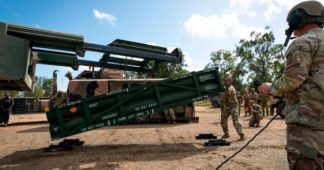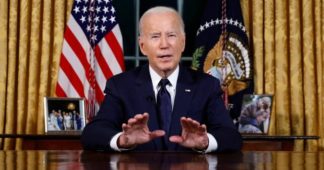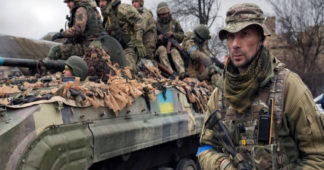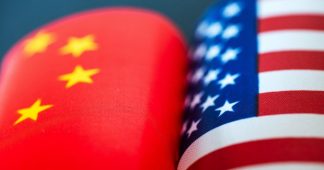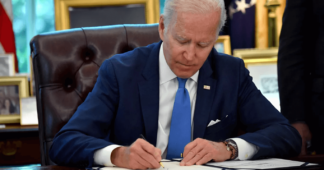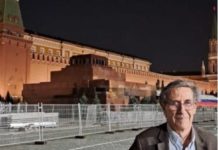Posted on
Jack F. Matlock, Jr. served from 1987 until 1991 as the US ambassador in the Soviet Union and from 1981 until 1983 in Czechoslovakia. Es served in the National Security Council under President Reagan and participated in several arms control summits, including in Reykjavik in 1986. In total he served 35 years in the US Foreign Service, from 1956 until 1991. From 1996 until 2001 he served was the George F. Kennan Professor at the Institute for Advanced Study in Princeton, New Jersey. He is the author of three books: Superpower Illusions (2010), Reagan and Gorbachev: How the Cold War Ended (2004) und Autopsy of an Empire (1995). What follows is the transcript of a conversation held on April 22, 2024. The transcript was lightly edited for clarity and length.
Mr Matlock, on April 20 a large bipartisan majority in the House of Representatives approved a $95.3 billion foreign aid bill. It sends $60.8 billion to Ukraine and the rest to Israel, Gaza, and Taiwan. Congress also approved other measures, including the extension of warrantless surveillance in the United States. Many members of Congress, especially Democrats, were waving Ukrainian flags on the floor of the House. What went through your head when you saw these images?
I think they’re making a very big mistake. First of all, these appropriations are not coming from the taxpayer. We have to borrow the money to cover these appropriations and we are already tremendously overextended overseas. We now have a national debt in excess of 33 trillion dollars, and it’s rising by as much as two trillion a year. As the chairman of the Federal Reserve has said, this is unsustainable.
Now, what is the purpose of these appropriations? The largest appropriation was for Ukraine. Ukraine cannot win this war on the terms that the Ukrainian leadership has enunciated. As a matter of fact, it would not be in Ukraine’s interest for Ukraine to recover all of the territory that Russia now occupies. The great majority of people there are Russian speaking while the current Ukrainian government has declared that Russian speakers are not true Ukrainians. NATO is already doing what would be required if Ukraine were a NATO member. More arms simply will enable more destruction, most of it in Ukraine itself. The longer this war goes on, the more territory Russia is going to take and probably insist on keeping. If it goes on much longer Ukraine will turn out to be a state which is hardly viable, particularly if it continues to define itself as anti-Russian, its main neighbor, and a country to which its eastern and southern areas belonged for several centuries.
Now, in the case of military aid to Israel, we keep pouring in money and arms when Israel is almost certainly engaging in genocide. This is a serious matter, and even though many of Israel’s actions have been condemned by our President, even though Israel is not doing what he suggests, he keeps arming them.
As for the aid to Taiwan, building up an American military presence there risks provoking the Chinese to try to absorb Taiwan by military means. The U.S. should not revise the policy President Nixon set when the US recognized the Chinese People’s Republic. Taiwan has a remarkably good economy that would hardly survive if China should attack. But if China should decide to invade, it would be folly for the United States to go to war with China. Such a war could easily go nuclear.
I’m sure you’re familiar with the work of Elbridge Colby. He’s a big proponent of what he calls a “strategy of denial,” essentially containing China, barring it through Taiwan from further power projection across the island chains in the South China Sea. He’s arguing that this is in America’s national security interest, that this is where America needs to invest. What’s your response to that?
I don’t think these arguments make sense. We say that our navy must dominate the South China Sea. How would we react if the Chinese, the Russians, or any other country would say, “we’ve got to dominate the Caribbean”? How would we feel if the Chinese were routinely flying around the border, picking up intelligence? We do it around theirs. I don’t buy the argument that the United States has an obligation to dominate the seas of the world. Of course we want them open for trade, and that’s also in China’s interest.
I think that militarizing the relations with China is a huge mistake. The Chinese government in the last 30 years has probably improved the lives of more people faster than any other government has in history. The Chinese GDP is equal to or greater than the American. Some see that as a threat, but I don’t. China has over four times the population of the United States. So why shouldn’t their GDP be at least four times as much as ours? This idea that the US has to be number one in everything, and that any country with an economy growing faster is a threat, is simply a false logic.
In the next couple of questions I wanted to work our way back through history. In 1997 you were a co-signer of an open letter by 50 voices from the US foreign policy establishment who called NATO expansion eastward “a policy error of historic proportions.” The letter also argued that NATO expansion would “strengthen the nondemocratic opposition” in Russia and “decrease allied security and unsettle European stability.” Are we reaping today what we sowed back then?
Yes, we are. I was strongly opposed to expanding NATO from the membership that it had in 1991. I was present at several meetings when US leaders, and also British and German leaders, assured Gorbachev and then Foreign Minister Shevardnaze that if East Germany was allowed to join West Germany and the united Germany stayed in NATO that NATO would not move further east. In fact, as Secretary of State Baker said several times, NATO would expand “not one inch.”
At their summit meeting in Malta in December of 1990, when Gorbachev and President George Herbert Walker Bush declared an end to the Cold War, there were several other statements. One of them was that the Soviet Union would not intervene in Eastern Europe if there was political change and the second was that the United States would not take advantage of that situation. Now, expanding a military alliance into those areas would obviously be taking advantage. I would say the whole concept of ending the Cold War was based partly upon the idea that the Western alliance would not expand.
There were good reasons to avoid expansion. Once the Warsaw Pact broke up and the Eastern European countries were allowed to go democratic with the encouragement of Gorbachev, there was no possibility the Soviet Union could invade Western Europe. That was the original purpose of NATO and it had been achieved.
And there is another aspect here, and that is our triumphalism. We ended the Cold War by negotiation and it was possible to end it when Gorbachev dropped the basic tenet of the Communist Party and its foreign policy, the Marxian “class struggle.” He dropped that totally in a speech to the UN in December 1988. Gorbachev announced that now the Soviet foreign policy was based on “the common interests of mankind.” That is the opposite of the previous Marxist-Leninist policy, and of course it also was the basis for trying to reform the Soviet Union and make it more democratic. If the Soviet Union allowed the East European countries to become democratic and it itself was reforming, why should we include them in a Western alliance which had been there to prevent a Soviet invasion of those countries? There was no longer any threat.
Actually, Russia accepted the initial expansion of NATO and also the expansion to include the Baltic states, but opposed extension to the Balkans and the establishment of foreign military bases there.
But there never was any good reason to expand NATO. At first we offered something called a Partnership for Peace which would have worked very well. It was acceptable to Boris Yeltsin, the then Russian leader, and to others. But the problem with NATO expansion was not so much the Article 5 guarantee that an attack on one will be considered an attack on the others. What was sensitive for Russia was the establishment of foreign and particularly American bases in these countries. The membership itself was not that important. It was only when we began to put bases there at the same time that relations deteriorated. This was during the second Bush administration, when the United States began to withdraw from virtually every arms control agreement which we had made and which were the basis of ending the Cold War.
It wasn’t just these 50 foreign policy experts who opposed NATO expansion. George Kennan and Henry Kissinger did too. William Burns, then in his function as US ambassador to Russia, sent a cable in 2008 that was published by Wikileaks clearly laid out the Russian opposition to Ukraine and Georgia’s proposed NATO membership. It was famously titled “Nyet means nyet.” If all that seemed so clear to the foreign policy establishment in Washington DC at the time, how come today you will hardly find any prominent voice opposing NATO membership for Ukraine and Georgia anymore? What changed?
It is very clear that during the decades from the late 90s and particularly the first decade of the 21st century there was a concerted effort by the US military-industrial complex to find “peer competitors” in order to justify huge and rising defense budgets. Those of us who negotiated an end to the Cold War were predicting that NATO bases in the free countries of Eastern Europe were going to provoke Russia, and Russia at that time was under very difficult straits economically.
I would remind people who say, “oh, Russia is always the aggressor” that it was the elected leader of the Russian Federation who led and enabled the breakup of the Soviet Union, which occurred in a peaceful way. The Baltic states had Boris Yeltsin’s support the whole time they were trying to get their independence. In this case the elected Russian leader is the one most responsible for breaking up the Soviet Union and when people say, “Russia always does this, Russia always does that,” this is nonsense because the Soviet Union was a Communist state quite different from current Russia. I would say in terms of such things as the use of espionage and propaganda, Russia and Ukraine have exactly the same heritage, and it’s really a competition between who puts out the most tendentious propaganda. But the thing is that people who start from abstract notions and draw conclusions forget all of the details that, in fact, make their conclusions irrational.
Let me just add here that I think that current policy, the policy that has produced many of these current mistakes, has a weak philosophical basis. Many say that it is our mission to promote democracy in the world. They don’t define exactly what democracy is. Actually, the word does not occur in the American Constitution. It does not occur in the oath of office that we take. It does not occur in the pledge of allegiance. We pledge allegiance to the flag of the United States of America and the republic for which it stands. Going back to the First World War, one of the reasons Wilson entered the First World War was to protect democracy. Wait a minute. Every country fighting in the First World War was an empire. Britain was as much an empire as Germany and Russia. Britain and France continued to expand their empires when the war was over. And so, did the United States really support democracy?
In other words, you think it’s a fraud that NATO is really defending democracy against authoritarianism in Ukraine.
The idea that an external power can induce another to be democratic gets it absolutely backwards. After all, if democracy is government of, by, and for the people, as Abraham Lincoln put it, how can any outsider impose it? The fact is, when an outsider begins to support certain factions in another country, they’re going to do them more harm than good. Just look at how we reacted to the, I think, false charge that Russia helped Trump’s election in 2016. That was a huge deception which many still consider a fact. Yes, Russia had some propaganda and trolls on the internet, but there’s no evidence it had the slightest effect on the outcome of the 2016 election.
But what I started to say was, particularly from the late 90s and in the 2000s you had the American so-called foreign policy elite, including the media, many of the think tanks and also in the government who tried to develop a policy to spread democracy abroad. Today, when we say we’re defending democracy when we support the Ukrainians, that’s absolute nonsense. The current Ukrainian government is the result of a coup d’etat in 2014 that removed an elected president. Areas that had broken away from Ukraine but Ukraine claims, had no vote. The current government is dictatorial and corrupt.
So what is to be done? I mean from the Russian perspective there is no chance to reinstitute Minsk-2. The former German Chancellor Amgela Merkel said that the Europeans used the Minsk accords to give Ukraine time to rearm (whether she said that to save her reputation is unclear). So, the Russians wouldn’t trust us anyway. We are angry at them for invading Ukraine, so can we just suddenly declare the conflict frozen? What do you think is the most likely and the most preferable outcome that is at the same time the most realistic?
The borders that the current Ukrainian government says they insist upon retaining were created by Joseph Stalin and Adolf Hitler and in the case of the Crimea by Nikita Khrushchev. These were not borders that were fought over and negotiated over with lots of elections and so on. What is West Ukraine had never been part of the Russian Empire when Hitler gave it to Stalin. Now, why are people shedding blood to recreate a heritage of Hitler and Stalin? And, by the way, in West Ukraine, you do have a very powerful Neo-Nazi movement which is militarized and which has been one of the major irritants to Russia. To deny that is simply to deny the facts.
I don’t understand why it is in the interest of the German people to follow the policies its government has now. Of course it’s up to them. It’s not for me to decide, but as an outside observer I thought they were doing pretty well when they had full economic relations with Russia. I saw nothing at all wrong with Nord Stream. Before Nord Stream 1 was put in operation most of the Russian gas was passing through Ukraine. The Ukrainians took out what they wanted, often not paying for it and if the Russians tried to collect by cutting back on the flow, the Ukrainians would still take what they wanted and reduce what was being passed to central and western Europe. So it was in the interest of Germany and Russia to build Nord Stream. I think that the objections were always political.
Now, let me just add one thing here that we haven’t talked about. And that was the effort by the United States and the EU to separate Ukraine from Russia. It came to particular shape in 2014 during the Maidan demonstrations in Kyiv. The violence, by the way, was started in the west by those neo-Nazi formations which began firing on the demonstrators. There had been an agreement that there would be an election by the end of the year, and it looked as if there would be a good chance that Yanukovych would lose. But nevertheless a coup d’etat took place, and one which Russia has every reason to believe was fomented by the CIA and by other NATO members, including the UK.
You like to point out that at the close of the Cold War it was the official position of the United States to prevent the collapse of the Soviet Union. President George H. W. Bush supported President Gorbechev’s proposed Union Treaty and said during a remarkable speech he gave inside the chamber of the Supreme Soviet of Ukraine in Kiev on August 1, 1991: “Americans will not support those who seek independence in order to replace a far off tyranny with a local despotism. They will not aid those who promote a suicidal nationalism based upon ethnic hatred.” Unsurprisingly, this line angered American hard-liners and Ukrainian nationalists and had no effect: Later that year, the Ukrainians still overwhelmingly voted for independence from the Soviet Union. But could you explain why President Bush Sr. took this position at the time?
I was on the plane with Bush when we flew from Moscow to Kyiv, and as he was preparing his speech for the Verkhovna Rada he personally put in and worded those sentences that you quoted. He did not want to see the Soviet Union break up. He did want the three Baltic states to acquire their real independence, and he supported that totally. The United States had never recognized the Baltic countries as legitimately part of the Soviet Union. As for the other Soviet republics, we did recognize that they were legal parts of the Soviet Union.
There were at least two reasons that Bush supported Gorbachev’s effort to create a voluntary union. One was that if they were going to be suddenly set loose before there was more democratic reform, the local Communist rulers would simply take over. Gorbachev was trying to change the system, and of course the red directors, as you would say, those who actually ran the system, were in opposition to these reforms.
The other reason was that we did not want to see a proliferation of nuclear weapons. We thought that would be very dangerous. Earlier there had been nuclear weapons stationed in many of these republics. By the time the Soviet Union broke up, there were nuclear weapons in only four, and it was very much part of American policy that if they broke up we wanted the weapons to be concentrated in Russia where they could be more easily kept under control. Many of these weapons were scheduled to be destroyed under the START treaty that was in effect. So we really did not want to see the breakup.
Well, your critics could object: Now wait, so you said we wanted to prevent nuclear proliferation, and we wanted to prevent Ukraine from becoming run by a despot. Those critics would say, today it’s a glowing beacon of democracy and that proliferation didn’t happen. So Bush was wrong, and the hawkish strategy toward the Soviet Union was right.
Proliferation didn’t happen because Ukraine, Belarus, and Kazakhstan transferred the nuclear weapons to Russia as the US demanded. But it is a travesty to say that Ukraine today is a democracy. It isn’t. It’s probably less democratic than Russia. And as I pointed out before, the current government is the result of a coup d’etat in 2014. From its very beginning as an independent state in December, 1991, Ukraine was deeply divided politically.
I went to Kyiv, it must have been either 1993 or 1994, with a group of people who had worked on our National Security Council. We had an agreement with the Ukrainian government to come and describe to them how we operated in the National Security Council in Washington. When we finished our presentation, a senior Ukrainian official commented: “You are talking about foreign relations, but our problem is internal.” And then they showed us maps of where the voting had been, with one side beginning with 85, 90% of one party in the West and then in the East 85 or 90% in the other party. And actually these elections were split almost 50-50. Over the following years, sometimes one side would get 50.1%, sometimes the other side, but it was always very close.
What made this particularly dangerous was the Ukrainian constitution which had the President name what we would call the state governors, the provincial chiefs. There was no election at the provincial level the way we Americans have. Obviously, that would not work if the country is very much divided, but that was how the problem started there and they got deeper and deeper and by 2014 the violence was started in the west and primarily by these Neo Nazi groups who first of all started taking over the provincial governors’ offices.
This is why one of the requirements of the Minsk agreements was that Ukraine would adopt a federal constitution that would let these Russian speaking entities elect their own leaders the way citizens of American states elect their governors. If we Americans had had the sort of system Ukraine had, we would have broken up long ago. You need a federal system like Switzerland has, for example, or Belgium, or in Finland where the Swedish minority has full cultural rights. But this is something the current Ukrainian government, those who control it, never conceded and, as I said, that was one of the requirements of the Minsk agreement. Why Germany and France didn’t insist that the Ukrainians abide by it if they were going to get any more aid, I don’t know. The United States should have, too. We approved the agreement, though we were not a signatory.
The current tragedy is that it is bad for everybody. Obviously the people suffering most are the Ukrainians and we also know that a few weeks after the Russian invasion they came very near coming to an agreement but were discouraged by Boris Johnson. They were also, I’m sure, discouraged by the United States.
You were a close adviser to President Reagan, who most people think of as a particularly hawkish figure with regard to the Soviet Union and Russia. He called the Soviet Union the “Evil Empire.” The received historical narrative is that he won the Cold War for us. He essentially outspent the Soviet Union because he sought its demise. In fact, his name is regularly invoked by Russia hawks in the West as someone who’d today be tough on President Putin and that Mr Reagan would be “turning in his grave” if he witnessed the opposition by some Republicans to more military aid for Ukraine, as the Polish President Donald Tusk put it recently. The Reagan you describe in your books, by contrast, was far from the hawk many of us read about. What did the Reagan you knew stand for in regard to Russia and America’s role in the world?
We were dealing with the Soviet Union and not Russia as an entity then. President Reagan knew the difference between the Soviet Union and Russia. He saw no conflict of interest between us and Russia. His problem was communism and the Soviet attempts to impose communism on others. Yes, he called the USSR an “evil empire,” but also by 1988 when he visited there he said that was in the past, that it’s no longer true, and he gave Gorbachev credit for changing it. So yes, he was an opponent of communism and of Soviet expansionism. But he was acutely aware of Russian losses during World War II and their contribution to the victory over Germany.
Another thing which differentiated Reagan’s approach from that of our more recent presidents is that, as much as he criticized Communism, he never publicly insulted a Soviet leader by name. When he met Gromyko, the hardline Soviet Foreign Minister, he shook hands saying, “We hold the peace of the world in our hands. We must act responsibly.” He made his main effort to try to understand Gorbachev and to build a spirit of trust with him.
Reagan was not an intellectual who had a great knowledge of history, but was eager to learn. He was a person who knew how to deal with other people. The last thing he would do would be to insult a Soviet leader publicly. As I said, he understood that Russia had suffered greatly during the Second World War, more than the United States, and that Russians needed respect for that. In fact, to the letters to Soviet leaders that I would draft for him he would always add in his handwriting something about the great respect he had for their performance during the war and their tremendous losses.
Later when our Western leaders refused to invite President Putin to World War II celebrations, such as on the anniversary of the Normandy invasion, and began to demonize him, largely for things he’s done at home, not anything he’s done to us—that is the very opposite of what Reagan would have done or did.
Basically Reagan was a man of peace and a man who knew how to negotiate, who didn’t start so much from abstract ideas as from concrete facts. As he would say at times, they have got a lousy system, these Communists, but if that’s what they want, it’s their business. And he thought the United States should be a shining city on the hill, an example for the world, not one that would go out getting involved in the politics of other countries. The negotiating approach he approved was one which was almost the opposite of what we’ve done since then. He tried to understand where Gorbachev was coming from, what he needed and we put all of our goals, not as demands that they do something we wanted them to do, but as suggestions that we cooperate to achieve a common end. We didn’t say, you’ve got to clean up your human rights situation. We said, let us cooperate to improve respect for human rights. In his first meeting with Secretary of State George Shultz Shevardnaze said, “can we talk about the status of women and blacks in the United States?” Shultz said, “Absolutely, I think we’re making progress, but we’ve got a ways to go, and we can use all the help we can get.” Everything we asked was reciprocal. We actually cooperated to end most of our confrontation in other hotspots.
Since then, there’s been this triumphalism and we saw Russia first as a defeated adversary and then an enemy when they had done nothing to threaten us. And I must say where the line is between Russia and Ukraine has never been a vital issue for the United States or any NATO member. It’s not our business. The current fighting has all of the emotional elements of a civil war. Ukraine and Russia have a deeply intertwined history and there’s not going to be peace between them unless they come to terms in a way which is accepted by both sides.
Many NATO analysts believe that within a few years Russia will be capable and also likely invade NATO territory. Just plain foolishness?
I don’t think they have the capability nor the desire. In fact, I don’t think there’s any desire to control those Ukrainians in Western Ukraine. I doubt that they would want to take Kyiv, for example. I doubt that very much. Now, if they keep advancing, they could take Kharkiv and they could take Odesa. And if we keep pouring in arms and some of these are used to hit territory in Russia proper, I don’t know. They have reserved the right to use nuclear weapons if necessary and I hope that that would never be considered necessary by them.
But I would also point out that there seems to be in the United States, and also among elements in Germany and the UK, the idea that all things Russian are inferior. And it’s true Russia has at times in their history been backward on some aspects of technology, although in the forefront of others. They were the first in space. There were times when we couldn’t get to the space station without using Russian rockets. So the idea that somehow they’ve got totally inferior technology, and we can weaken them by cutting them off, forgets that they are a country with enormous resources, both human and physical, and in a number of areas when we have applied pressure, they have leapfrogged us.
Despite the sanctions.
I think that the whole policy of economic sanctions has been overused. I can’t think of a time when economic sanctions have produced political changes that have to do with security. We have developed an enormous bureaucracy to sanction not only people who are enemies, but sanctions for things they’re doing at home which should be their business and also, secondarily, to sanction other countries that are not under our jurisdiction. I think this is a misuse of the position that we are in, and it’s going to undermine it. And the fact that we are doing this, actually increasingly on borrowed funds, is not sustainable indefinitely. I wonder how many Europeans, especially Germans, are paying attention to that.
At 94, you still chime in on current events. In February you wrote in an essay that Soviet Deputy Foreign Minister Ivan Aboimov quipped to you in December 1989: “We have given the Brezhnev Doctrine to you with our compliments. Consider it a Christmas gift.” What did he mean by that? Is the West pursuing a Brezhnev Doctrine of sorts today?
I think we are. Our policy today is called the “rules-based international order.” Of course we violate those terms when we wish. In many cases it seems that we’re operating on the same principles that brought us the First and Second World Wars, that is fighting over who controls what territory. If we didn’t learn in the first half of the twentieth century that that is a loser for everybody, then I think we are ignoring the history that should have taught us some vital lessons.
According to Marx and Lenin, there was going to be a worldwide proletarian revolution which would eliminate the bourgeois class, the ruling class, as they put it, and create socialism which would develop into communism. The Brezhnev doctrine was that if a country had achieved socialism, it was the duty of other socialist countries to protect it if it was opposed. That was the rationale that the Soviet Union used to invade Hungary when it revolted in 1956, and then later Czechoslovakia when the Prague Spring began to democratize it. This was the Brezhnev doctrine.
What we now say is that we must protect and defend democracy overseas and create it for other people. Isn’t this saying the same thing that Brezhnev was saying about socialism? Never mind that the socialism they had was not what Marx had predicted. The idea was that it is in one’s interest to change the form of government that other countries have and that if they have your form of government, they would be friends. Of course, all of our historic experience refutes that, even in the case of the Soviet Union. First you have Yugoslavia and Albania breaking from Soviet control, then the great split with China. Later our fear was that if the Communist Vietnamese won, Moscow would control virtually all of Eurasia. In reality, the same form of government did not necessarily make countries friends.
When we think that we can create democracy elsewhere or even facilitate it by direct intervention in their affairs, I think that gets it backwards. We should go back to the idea that Senator Fulbright expressed in two of his books: the only way to spread democracy is to prove how it works at home. And I must say we’re not setting a great example these days.
Countries become authoritarian because they feel threatened and they need a strong leader to push off those threats. That’s why many Russians, though uncomfortable with the war in Ukraine, still support it. They see it as defense against NATO and the United States. We have declared that we are trying to weaken Russia. We have imposed sanctions that are normally permissible only during a declared war. And so we have a esituation where most likely a greater percentage of Russians approve Putin’s policies than the percentage of Americans who approve of either Biden or Trump. They’re both running about 40% or lower. Who’s more democratic?
My last question might sound odd. If anybody else had said what you just said, the critics who are reading this interview, the Anne Applebaums of the world, will say, ”well, Jack Matlock is a Kremlin stooge. He’s a Putin puppet. He’s spreading misinformation.” Heck, they will say this even about you. What goes through your head when you see this type of rhetoric, where domestic opposition to US foreign policy is regarded essentially as high treason?
I think that is absolutely ridiculous. First of all, these critics never cite anything I have said that is Kremlin propaganda. I didn’t want any of these conflicts to happen and that’s why I warned against NATO expansion. The war in Ukraine was predictable for reasons I’ve given. The sort of actions “the West” took were going to create a reaction, and I think it is a tragedy. It is a tragedy what has happened to Russia, what is happening to Ukraine. And of course I agree that Putin’s invasion was a crime. I’m also quite aware that my presidents have committed crimes, and I think in some cases with less provocation. Iraq was not a threat to the United States. A Ukraine with NATO bases would be a threat to Russia. Let’s face it. Why can’t people understand that? I certainly don’t defend Putin, but I also don’t defend my own President when he sends bombs to Israel to create a genocidal war. So this is not propaganda. I speak from experience, from having lived through different periods, trying to learn from them, and from having helped to devise a group of policies that brought an end to the very dangerous Cold War, policies which have been reversed since and are bringing us to another crisis.
The interview was led by Gregor Baszak, a Chicago-based writer and academic. His writing has appeared in The American Conservative, The Bellows, Cicero, Sublation, UnHerd, and elsewhere. Follow Gregor on X @gregorbas1.
We remind our readers that publication of articles on our site does not mean that we agree with what is written. Our policy is to publish anything which we consider of interest, so as to assist our readers in forming their opinions. Sometimes we even publish articles with which we totally disagree, since we believe it is important for our readers to be informed on as wide a spectrum of views as possible.
